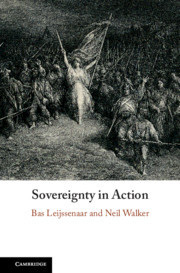Description
Sovereignty in Action
Coordinators: Leijssenaar Bas, Walker Neil
Sovereignty, originally the figure of 'sovereign', then the state, today meets new challenges of globalization and privatization of power.
Language: English
Subject for Sovereignty in Action:
Publication date: 07-2019
244 p. · 15.6x23.5 cm · Hardback
244 p. · 15.6x23.5 cm · Hardback
Description
/li>Contents
/li>Biography
/li>
Sovereignty in premodern times evoked the dynastic figure of the 'sovereign' or territorial monarch. In modern times, it became a more abstract idea, referring to the power of the state, later of the people or 'the popular sovereign' as articulated and refined through constitutional arrangements. Today these inherited understandings of sovereignty confront various new challenges, including those of globalization, privatization of power, and the rise of sub-state nationalism. An examination of key historical writers and trends from the seventeenth century onwards, including Hobbes, Bodin, Constant, Rousseau and Schmitt, brings out these developments and challenges. Sovereignty remains a malleable and 'active' feature of the global configuration of power. Will sovereignty become a redundant concept over time, or will it remain a key part of the grammar of modern politics?
List of contributors; Preface; Introduction: sovereignty in action Bas Leijssenaar and Neil Walker; Part I. Theory in History: 1. Post-sovereignty? Dieter Grimm; 2. When sovereigns stir Neil Walker; 3. The people as popular manifestation Jason Frank; 4. Sovereignty, action, autonomy Raf Geenens; Part II. History of Theory: 5. Liberal governmentality and the political theology of constitutionalism Miguel Vatter; 6. Popular sovereignty: the people's two bodies Pasquale Pasquino; 7. Nations against the people. Whose sovereign power? Olga Bashkina; 8. A positive or negative conception of sovereignty? Marcel Gauchet, Benjamin Constant and liberal democracy Nora Timmermans; 9. Political idolatry: the relation of Schmitt's two claims in Political Theology Stephanie Frank; Index.
Bas Leijssenaar works at the Centre for Ethics, Social and Political Philosophy at Katholieke Universiteit Leuven, Belgium. His research is focused on theories of sovereignty and constituent power in nineteenth-century and contemporary debates. The aim of his Ph.D.-project, funded by the Research Council Flanders (FWO), is to develop a pluralist conception of constituent power. He is one of four founding members of the Constituent Power Network, an international research network dedicated to the study of constituent power from interdisciplinary perspectives.
Neil Walker holds the Regius Chair of Public Law and the Law of Nature and Nations at the University of Edinburgh. His main area of expertise is constitutional theory. He has published extensively on the constitutional dimension of legal order at sub-state, state, supranational and global levels. He was Professor of European Law at the European University Institute, Florence (2000–8), and has held various visiting appointments. His most recent books include Intimations of Global Law (Cambridge, 2014) and The Scottish Independence Referendum: Constitutional and Political Implications (co-edited with Aileen McHarg, Tom Mullen, Alan Page, 2016).
Neil Walker holds the Regius Chair of Public Law and the Law of Nature and Nations at the University of Edinburgh. His main area of expertise is constitutional theory. He has published extensively on the constitutional dimension of legal order at sub-state, state, supranational and global levels. He was Professor of European Law at the European University Institute, Florence (2000–8), and has held various visiting appointments. His most recent books include Intimations of Global Law (Cambridge, 2014) and The Scottish Independence Referendum: Constitutional and Political Implications (co-edited with Aileen McHarg, Tom Mullen, Alan Page, 2016).
© 2024 LAVOISIER S.A.S.




